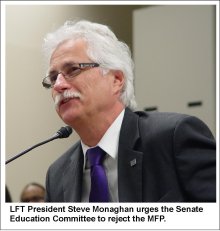Overwhelming opposition from LFT, school boards, superintendents and special education community spells doom for the $3.46 billion spending plan

Without opposition, Sen. Claitor’s motion was adopted. That means Louisiana’s public school budget will in all probability be based on the 2011-12 MFP, the most recently adopted version that passed legal muster.
“This is a major victory,” said LFT President Steve Monaghan, who pointed out that nearly 16,000 e-mails were sent to senators from members of the LFT Action Center opposed to the MFP.
Under normal circumstances, if the legislature rejects an MFP, the formula is returned to the Board of Elementary and Secondary Education for reconsideration. If BESE does not act, the previous year’s formula remains in effect.
But this is not a year for normal circumstances. The current MFP was ruled unconstitutional because it was introduced too late last year, and did not receive enough votes in the House of Representatives. With BESE apparently having no intention of meeting prior to the legislative session’s end on June 6, that means the 2011-12 formula will be operative.
A year ago, Monaghan told the panel, the LFT issued a position statement warning of the results if the current MFP was adopted. Prior to today’s vote, he read the final paragraph of that prescient document aloud: “If this formula is approved, it will certainly be the subject of a long, expensive judicial process. It will be much better for the state and for our children if this formula is returned to BESE. If the state board is unable to agree on a revised formula, then at least the MFP will revert to a much less controversial and constitutional computation.”
Today’s vote came after a sustained campaign by the LFT, the Louisiana School Boards Association and the Louisiana Association of School Superintendents to reject the formula. Adding considerable influence to the fight was the special education community, which saw the formula as an assault on the rights of children with special needs.
State Superintendent of Education John White had touted the new special education portion of the MFP as a pilot program aimed at improving graduation rates for those students.
But opponents quickly pointed out that the program was not a pilot in any sense of the word – it was not being field tested and evaluated in a small setting before being imposed statewide.
BESE President Chas Roemer criticized the committee action, calling it “bad policy” and “a step backward.”
Roemer said that rejecting the MFP will force the state to pump an additional $30 million into public schools next year to pay the full cost of students who attend specialized public schools like the Louisiana School for Math Science and the Arts, the New Orleans Center for Creative Arts and the Louisiana School for the Deaf. The proposed formula would have required students’ home school systems to pick up some of the cost for those schools.
The MFP has taken a confusing path to defeat this year. Just a week ago, the same committee turned down a version of the MFP, only to be told that BESE had accidentally sent the wrong document to the Senate for action.
The problem, Supt. White told the committee, was that a staff member had “used the wrong Word file.”
